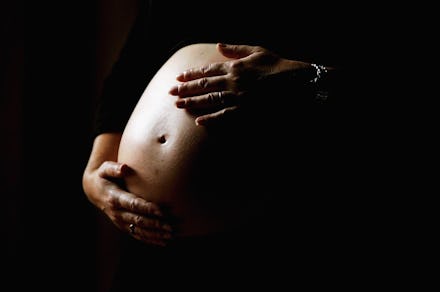The Untold Cost of Discrimination We're Passing on to Our Kids

Parents can try to shield their children from prejudice, but new research from the University of Colorado at Denver suggests that bias can have lasting physiological effects on babies before they're even born. In the study, published on January 8 in Social Science and Medicine, women who've been victims of ethnic discrimination exhibited higher-than-average levels of the "stress hormone" cortisol — and so did their 6-week-old infants.
The study: Researchers from Denver and New Zealand recruited 64 pregnant Kiwi women from Auckland, a multicultural city with high health disparities. The women, who represented the indigenous Maori people and several immigrant populations, answered surveys about their experience with verbal and physical assault, as well as other forms of ethnic prejudice. Then, researchers measured levels of cortisol in participants' saliva in the morning and at night.
Morning cortisol: High levels of the hormone cortisol are linked to anxiety and hypertension, but cortisol isn't objectively bad. Moderate levels of hormone are healthy — we need some amount of stress to keep us motivated and alert throughout the day. So, as Denver anthropologist and study author Zaneta M. Thayer explained, cortisol levels should be highest in the morning and gradually decline during waking hours. By the time we're putting on pajamas, we should be low on cortisol and ready for some REM.
Participants who said they'd faced ethnic discrimination had overall higher levels of cortisol at night, but not in the morning, which means their cortisol levels didn't decrease throughout the day as they do in less-stressed people. Six weeks after participants gave birth, researchers also tested cortisol levels in the saliva of their newborns. Children of women with high cortisol levels similarly had a lot of the hormone in their spit.
Everyone's problem: Thayer said that researchers controlled for several variables, which means they took into account other factors that could explain the link between discrimination and stress, including socioeconomic status. She said she'd expect to arrive at similar study results in another multicultural country, like the U.S.
Cortisol levels are a standard measure of stress, according to Thayer. So, it makes sense that stressed-out victims of ethnic discrimination were heavy on the hormone. The more pressing question at hand is: How does a fetus inherit high maternal cortisol levels? Thayer mentioned a few possible explanations, including breast milk, but identified the placenta as the main suspect.
The placenta, that semi-clear sac that nourishes the fetus, has enzymes that convert cortisol into a weaker version of itself. However, the placenta can only convert so much cortisol. When the concentration is abnormally high, Thayer posits, some of the non-converted hormone seeps into the womb. Again, a moderate amount of cortisol is healthy for fetal development. Babies who are born prematurely sometimes need synthetic cortisol injections to prompt lung development. But, too much cortisol comes with health problems.
Generational fallout: The meaning of high cortisol levels during infancy isn't entirely clear. But infants who already have more symptoms of stress compared to their teeny-tiny peers could face health disparities down the road, perhaps related to mood disorders and cardiovascular disease.
Looking at the study more broadly, inheriting bias-induced stress might be part of an observed phenomenon in which maternal health influences a child's health and development. Some researchers focus on what's called the epigenetic impact of maternal health, which is roughly the study of how environmental factors (e.g., stress, smoking, diet) actually change genes. Thayer says she's working on an epigenetic study to see if discrimination against mothers could change the expression of genes related to cortisol production in children.
So, in addition to inheriting hazel eyes and supreme spelling skills, a child may also get a predisposition to stress-related illness, all thanks to some jackass who yelled ethnic slurs at her mom. All the more reason to take every opportunity to be kind.
This article has been updated.